Scopes Monkey Trial
One of the most famous events in the early part of the 1900s took place in Dayton, Tennessee, in 1925. Popularly known as the Scopes Monkey Trial, the trial attracted national known lawyers and most of the nation’s larger newspaper media.
Ironically the issue came to trial because progressives wanted to test, and hopefully, overturn a recently passed state law that made the teaching of evolution illegal.
Legislators wanted to make sure that schools taught the Biblical version of creation, rather than evolution scientific theory. This theory, first proposed by Charles Darwin, stated that humans had evolved from apes (thus the monkey part of the trial’s name).
After the law passed in 1925, the American Civil Liberties Union(ACLU) announced that it would fund any legal expense for a Tennessee teacher who wanted to defy the law. In Dayton, Tennessee, a group of businessmen decided to take the ACLU’s offer. They settled on a 22 year-old-teacher, John Thomas Scopes. Scopes, who did not teach biology, agreed to participate.
The Dayton leaders, thinking the publicity would be good for the town, had Scopes indicted under the new law. Scopes, who wasn’t even sure that he had even taught evolution, hoped he wouldn’t be required to testify.
Former presidential candidate William Jennings Bryan argued for the state, while ACLU member Clarence Darrow defended Scopes. Darrow was the most famous lawyer in the nation, and the courtroom was overflowing as people crowded in to hear the lawyers.
Both attorneys were very articulate and made eloquent speeches. Bryan appealed that the court to not “humiliate the great state of Tennessee by admitting for a moment that people can come from anywhere.”
Darrow declared that “unless there is left enough of the spirit of freedom in the state of Tennessee, and in the United States, there is not a single line of any Constitution that can withstand bigotry and ignorance when it seeks to destroy the rights of the individual.”
Although Scopes was found guilty, he was only given a fine, and eventually the conviction was overturned on a technicality. The Anti-Evolution Act remained the official law until 1967, despite repeated attempts by the Tennessee scientific community to repeal it. Tennessee became nationally infamous for the Scopes court decision, as well as for its seemingly stubborn refusal to accept modern science.
Picture Credits:
- Photo showing Clarence Darrow in court. Darrow is pictured in the center of the photo leaning on a table seating the defense. This photo was taken in 1925 inside the Dayton Courthouse in Rhea County, Tennessee. Tennessee State Museum Collection, 2008.151.2.
- Photograph showing Clarence Darrow and William Jennings Bryan seated together. Darrow is shown holding a cigarette and Bryan is shown holding a fan. This photo was taken in 1925. Tennessee State Museum Collection.
- Photograph of John T. Scopes. This photo was taken in 1925. Bryan College.
- Photograph entitled, “Preacher on a soapbox.” This photo was taken in July 1925. It was taken one block from the courthouse. Tennessee State Library and Archives.
- Photograph of Williams Jennings Bryan in court. This photo was taken in 1925 inside the Dayton Courthouse in Rhea County, Tennessee. Bryan is shown giving a speech. Tennessee State Library and Archives.
- Photograph of the “Scopes Trial Jury.” This photo was taken in July 1925. The twelve trial members and the trial judge are all shown. Tennessee State Library and Archives.
- Photograph of scientists called to testify in the trial. This photo was taken in 1925. The scientists, who included an anthropologist and a zoologist, were summoned by Darrow, but were not allowed to testify. Bryan College.
Confronting the Modern Era >> Life in Tennessee >> Making Life Better >> Scopes Monkey Trial
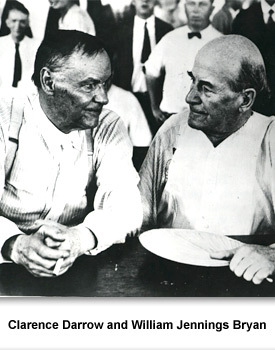
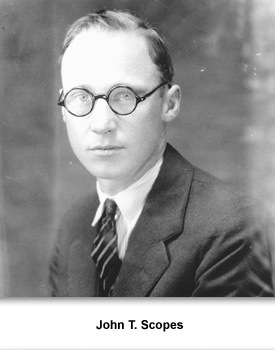
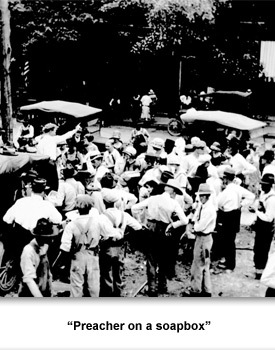
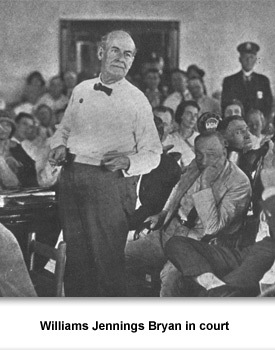
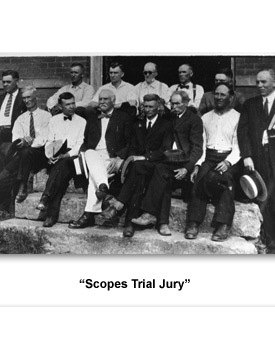
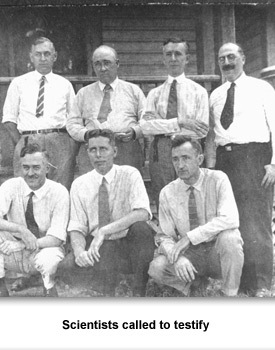
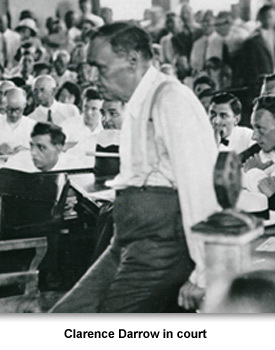
 Sponsored by: National Endowment for the Humanities
Sponsored by: National Endowment for the Humanities